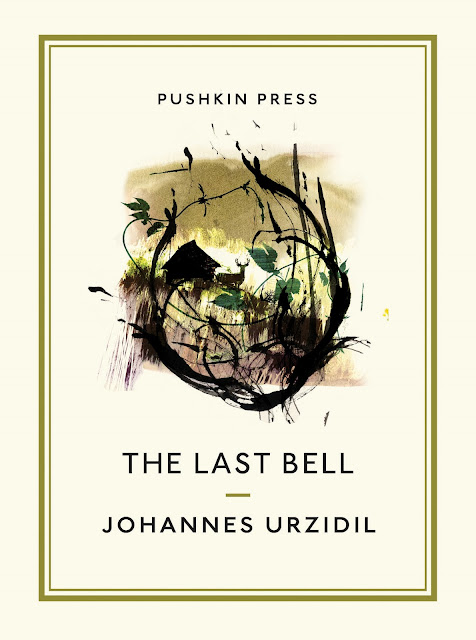"The Last Bell"
Short stories by Johannes Urzidil
(translated by David Burnett)
One does not escape from despair, hopelessness,
suicide by demonstrating with great diligence and accuracy how nauseating,
shallow, stale and fruitless all our actions are, but by trying to believe in
life by virtue of the absurd…
This extract, taken from an essay he wrote in 1965, is a good indication of the writing philosophy of Czech author Johannes Urzidil (1896-1970). In his introduction to this anthology of five short stories, translator David Burnett compares Urzidil's style with that of his friend Kafka, bringing out the contrast between Kafka's "quintessentially tortured soul" and Urzidil's writing, which "exudes a sense of certainty, the warmth of a well-ordered universe". Reading this comment, one might be forgiven for expecting this anthology to provide mere escapist fare. Nothing could be further from the truth. Each of the stories centres around outcasts - individuals whose decisions trigger disastrous consequences which they could never have predicted. And the personal woes of these characters are looked at squarely in the face and presented as a reflection of the wider human predicament - that messy thing called Life.
This extract, taken from an essay he wrote in 1965, is a good indication of the writing philosophy of Czech author Johannes Urzidil (1896-1970). In his introduction to this anthology of five short stories, translator David Burnett compares Urzidil's style with that of his friend Kafka, bringing out the contrast between Kafka's "quintessentially tortured soul" and Urzidil's writing, which "exudes a sense of certainty, the warmth of a well-ordered universe". Reading this comment, one might be forgiven for expecting this anthology to provide mere escapist fare. Nothing could be further from the truth. Each of the stories centres around outcasts - individuals whose decisions trigger disastrous consequences which they could never have predicted. And the personal woes of these characters are looked at squarely in the face and presented as a reflection of the wider human predicament - that messy thing called Life.
Take the narrator of "The Last Bell". She is a maid who has an unexpected windfall when her employers, a Jewish couple, flee the Nazi occupation, leaving her mistress of their apartment and all their worldly goods. Unsurprisingly, her joys are short-lived, and her tragedy becomes symbolic of all the victims of Nazi barbarity. (Urzidil himself fled to England after the German occupation in 1939, eventually settling in the United States). In "The Duchess of Albanera", the protagonist is an introvert who, uncharacteristically acting upon an unexplained impulse, steals a portrait from a gallery, blissfully unaware (until too late) that this act of folly has torn the gallery guard's family asunder. What starts as a surreal romp ends with a philosophical meditation about a world peopled by the "guilty-innocent and the innocent-guilty".
So what is it that makes Urzidil's writing so life-affirming? For starters, there's the humour which always bubbles right beneath the surface. It is a humour which can also be dark and bleak, but is rarely cynical and never cruel. It is difficult to dislike Urzidil's mumbling, fumbling, bumbling protagonists - they might be figures of fun but their portrayal is always sympathetic. There's also a humanity to his characters - even the most heartless of them (for instance the Nazi officials of "The Last Bell") are never mere caricatures.
Two of the stories featured in this anthology - "Borderland" and "Where the Valley Ends" - and part of a third - "Siegelmann's Journeys" - are set in the forests of Bohemia at an unspecified period prior to the two World Wars. It is a timeless, fairytale backdrop which owes much to German/Austrian Romanticism. Indeed, Urzidil himself makes explicit reference to the works of Adalbert Stifter and I was reminded of the mysterious, magical atmosphere of The Jews' Beech. "Where the Valley Ends" is a cautionary tale about the theft of a cheesecake which brings about discord between the two small communities on either bank of the river. Typically, what appears a rather banal premise becomes an excuse for conceptual ruminations about justice and peace: Nothing makes a just man more sad than complete triumph, since he knows how convoluted justice and injustice are at bottom, and that even the most righteous person has only half a case before God... In "Borderland" - a story praised by Hermann Hesse on its publication - Urzidil skirts the supernatural with a portrayal of a "magnetic" girl who seems to be able to commune with Nature, until the awakening of her sexuality. It is a universal, mythical theme - redolent of Adam and Eve's expulsion from the Garden of Eden, or Enkidu's loss of innocence in the Epic of Gilgamesh. This story will haunt me for a long time.
A final thought - English is often hailed as a modern-day lingua franca, a language which acts as a bridge across the globe. Yet, there are deserving authors who seem to fall through the cracks. It is sobering to discover that Urzidil's stories have been translated from German into Czech, Spanish, French and Italian but this is the first-ever collection of his work to be published in English. So, kudos to translator David Burnett and Pushkin Press for bringing these little gems to a wider public, and in such an attractive edition to boot.
Paperback, 192 pages
Published March 2nd 2017 by Pushkin Press








No comments:
Post a Comment